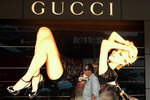Standard Chartered sees potential in yuan-trade finance
Updated: 2011-08-29 11:31
(Wall Street Journal)
|
|||||||||||
HONG KONG - Multinationals that trade with China and need to hedge their yuan exposure will be a good source of business for Standard Chartered PLC, a senior executive at the bank's Hong Kong unit said Friday, the Wall Street Journal reported.
Last year, China relaxed rules on offshore yuan trading, fueling growth in settlements in the Chinese currency. Standard Chartered saw a 60% jump in the first half of this year in its clients' trades settled in yuan from the second half of last year, and expects demand to grow from clients looking to hedge their yuan exposure, an executive said.
Benjamin Hung, chief executive at Standard Chartered Bank (Hong Kong) Ltd told Dow Jones Newswires in an interview that there's greater potential to help clients hedge currency positions to facilitate yuan-trade settlements compared with earning fees in the offshore yuan-bond business. The need to bulk up StanChart's hedging business is also important as fees from such bonds, or so-called 'dim sum' bonds, are typically minimal.
The emerging markets-focused lender—which is one of Hong Kong's three note-issuing banks—has been at the forefront of the burgeoning offshore yuan business, underwriting billions of dollars worth of dim sum bonds and actively boosting spot and forwards trading in yuan over the last year.
Foreign companies have in the past used mainly the US dollar to settle payment for goods from their Chinese trading partners. However, the more liberal rules governing offshore yuan trading, as well as expectations of further appreciation in the Chinese currency, are fueling rising demand for trades to be settled in the renminbi.
In 2010, China recorded 506.3 billion yuan ($79.27 billion) in yuan-trade settlements, representing 5.7% of its overall foreign trade, according to figures from China's central bank.
In the year-to-date, banks have underwritten $8.44 billion worth of dim sum bonds, surging 60% from total issuance of such bonds in 2010, according to data provider Dealogic.
Still, Hung said helping the market to evolve is more important than making money through higher bond fees.
"It's just in the beginning phase...if you're trying to use it as a milking machine, you're playing it wrongly," Hung said.













